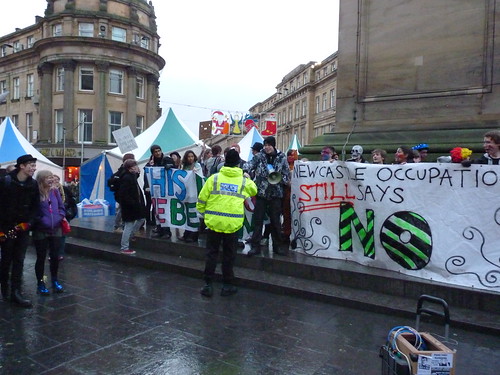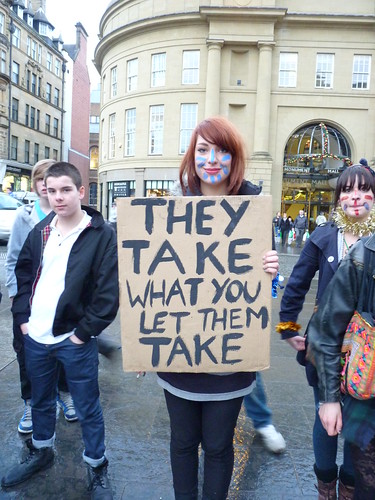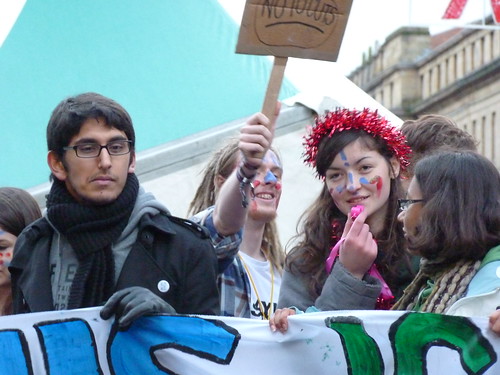Imagine you’re at a party with someone. They’re someone you admire, someone a lot of people around the world admire. You’ve been talking all night, flirting a little maybe. You both have had a drink or two. You’re having so much fun, you feel like telling the world about it. Thank fuck for Twitter!
You get this feeling that they might be, you know, interested. It might be quite fun to sleep with them actually, you think. Maybe you even hope for more than just sex.
They kiss you and you kiss them back. Things go a little further. You’re having fun. At some point you fish a condom out of your pocket and hand it to them. They agree to use it. It’s common sense, right? Right. You’re still having fun. It’s all good.
But at some point something changes. Maybe it hurts when they penetrate you. (You do not need a vagina to play along with this game. Go on, try to imagine.) Maybe they’re simply not that good in bed, and you’re not having fun anymore. Maybe they’re not using that condom you handed them and you’re worried about your health. It doesn’t matter what it is. You’re not having fun, you don’t want to do this anymore, you ask them to stop.
And they don’t. They keep, you know, fucking you. There is a foreign object inside your body, moving in and out. There is another person on top of you, clearly enjoying themselves, while you may be in physical pain, and even if not, by this point you’re alomst certainly emotionally traumatised. They finish, roll off you and go to sleep.
You, on the other hand, lie awake wondering what you did wrong. Were you not clear enough when you asked them to stop? Should you have struggled? Maybe it was a misunderstanding? You know, they’re from a long way away, you’re speaking to them in a language foreign to you. You feel violated; you feel ashamed. And they’re this incredibly cool person everybody likes, so it must have been you doing something wrong, right?
You wake up next to them the next morning. They’re staying at your house for a couple of days which makes things awkward. You don’t feel that same happiness and elation being around them anymore. You remember you told the world how awesome it all was? You’re not quite sure anymore, you’d like to take that back actually. So you delete your tweets.
A few days later you meet someone who’s also slept with your partner. You talk to them for a while and a picture begins to emerge. Their story is a little different, but there are enough similarities that suddenly you don’t feel quite so alone and isolated anymore. Maybe if there’s two of you it’s not you who did something wrong. Maybe this incredibly cool person whom all the cool kids like is actually at fault. An ugly word enters your brain. Were you raped?
It takes another couple of days for your mind to wrap itself around this. The sense of shame and self-blame don’t exactly subside. You’re this strong person, you’re a public figure, you’re well known for your work on gender equality. How did you let yourself be raped? What did you do wrong? But a few days later you eventually gather all your courage, hold you head high, repeat to yourself three times “It was not my fault”, and walk into the police station.
At which point the entire internet turns on you.
***
Point being this: I don’t care if you’re a left-wing feminist man who’s struggling with the idea of a freedom of information campaigner not being pure and perfect, or if you’re simply an Assange fanboy who’s never even considered how a woman might feel about sex. Please try to remember that there are two sides to every story. Oh yes, she might once have met someone who met someone who had a second cousin twice removed who worked for the CIA. She might be a public figure and an outspoken feminist. She might have been a groupie, she might have been drunk, she might have slept with all of Sweden before she slept with Assange, and she might have deleted those Tweets. And almost certainly, her case is being used by Assange’s enemies to discredit him and make his life difficult. None of that matters. What matters is what happened between Julian Assange and those two women, and none of us know any of it. Maybe one day it will all come out in court, maybe it won’t. But smearing an alleged rape victim because you can’t cope with the moral ambiguity of someone who does good work in one area also having committed a crime in another area is not the way to make either yourself or the person you’re trying to defend terribly popular.
Support WikiLieaks. Even donate to the Assange defence fund – he, like anyone else, has the right to a fair trial. Make your voice heard to ensure that any trial will be fair and transparent. But whatever you do, do not blame the alleged victim. Do not seek to smear the alleged victim. Even if it’s just for one minute, consider how she might feel, why she might have done the things you accuse her of having done, how this looks from her point of view and what impact it’s having on her life.
PS This is a direct response to this article, which someone on my Twitter feed called a brilliant piece of investigative internet journalism.



